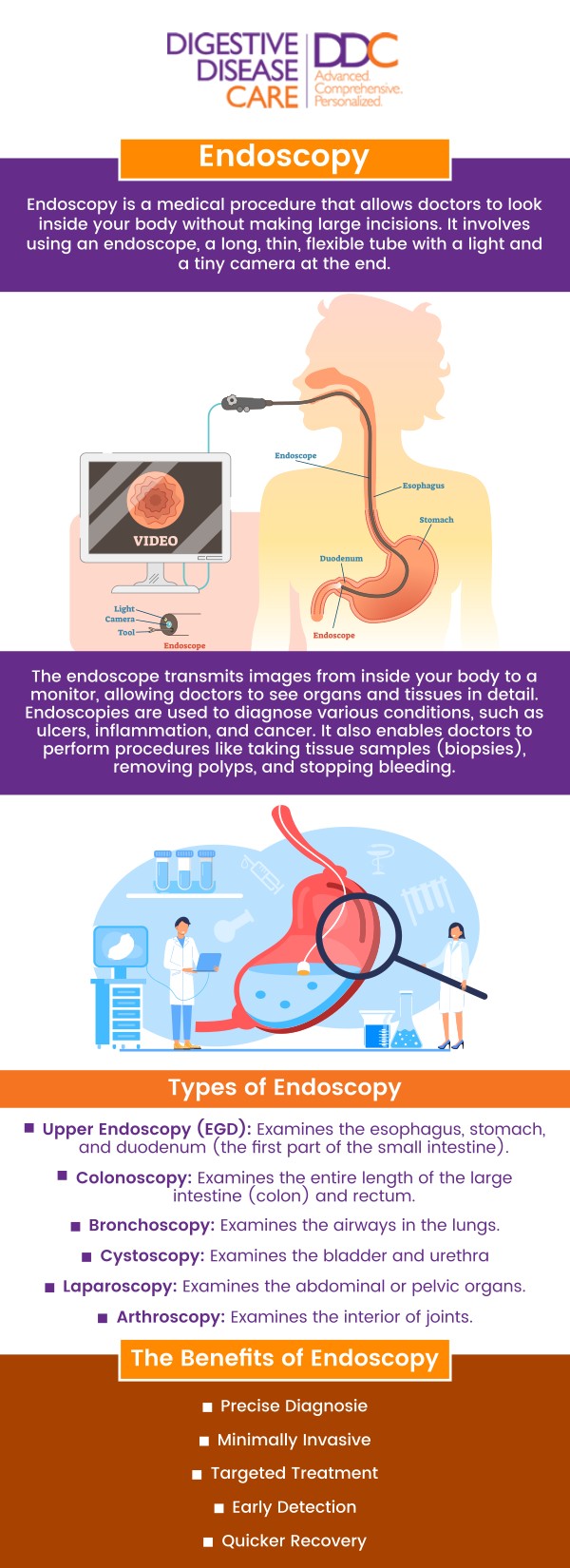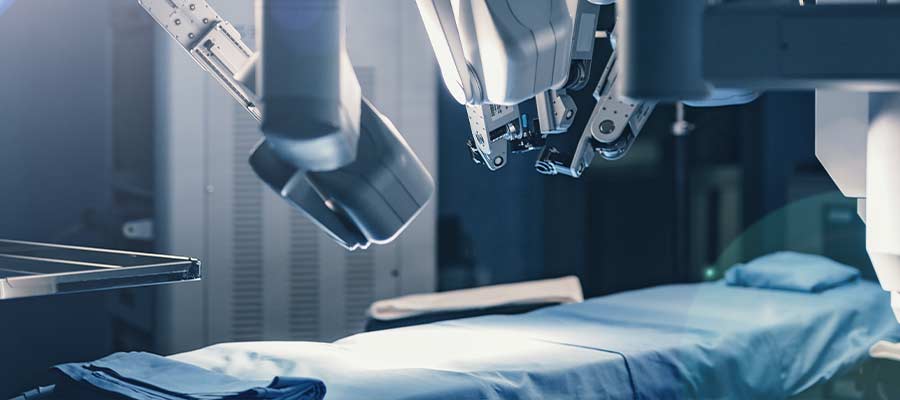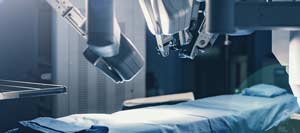Top Endoscopy Specialist in New Hyde Park, NY
An endoscopy is a medical procedure that allows physicians to examine the inside of the body using a flexible tube with a camera attached to it. This non-invasive technique has revolutionized the way doctors diagnose and treat a wide range of medical conditions. However, not all patients require an endoscopy, and it is essential to understand when it is necessary. Visit Digestive Disease Care (DDC) to get comprehensive and expert care from a board-certified gastroenterologist in New Hyde Park NY. For more information, please contact us or request an appointment online. We are conveniently located at 1575 Hillside Ave, New Hyde Park, NY 11040.




Table of Contents:
What are the signs that you should have an endoscopy?
Do doctors perform any tests before an endoscopy?
What is the success rate of an endoscopy?
How long does an endoscopy usually take?
An endoscopy is a minimally invasive diagnostic tool that allows physicians to examine the internal organs of the body. There are several types of endoscopies, including upper gastrointestinal endoscopy, lower gastrointestinal endoscopy, bronchoscopy, and cystoscopy, among others. During the procedure, a flexible tube with a camera attached to it is inserted through the mouth, anus, or other openings, and images of the internal organs are transmitted to a monitor. Endoscopies are commonly used to diagnose and treat conditions such as ulcers, polyps, tumors, and inflammation.
An endoscopy is indicated for a variety of gastrointestinal symptoms, including abdominal pain, bloating, and nausea. It is also used to investigate reflux symptoms such as heartburn and regurgitation. In addition, an endoscopy is recommended for patients who have unexplained weight loss, anemia, or blood in the stool. These symptoms may indicate a more serious condition, such as cancer, and endoscopies can help diagnose and treat the problem.
The decision to perform an endoscopy is based on several factors, including the patient’s medical history and physical examination. Other tests, such as blood tests, imaging studies, or biopsy results, may also be considered. The risks and benefits of endoscopies are also considered, as the procedure may cause complications such as bleeding or perforation. However, the benefits of early diagnosis and treatment often outweigh the risks, and an endoscopy is a valuable tool in the management of many medical conditions.
The purpose of pre-endoscopy tests is to ensure patient safety during the procedure, assess their health status, and identify potential risks. Endoscopies involve inserting a tube into the body, which can cause complications if the patient is not healthy enough to undergo the procedure. Pre-endoscopy tests help doctors determine the appropriate endoscopy procedure to be performed, such as upper or lower gastrointestinal endoscopy. By assessing the patient’s health status, doctors can also identify potential risks and take necessary precautions to prevent complications during the procedure.
Common pre-endoscopy tests include blood tests to check for anemia, infection, and liver function, an electrocardiogram (ECG) to evaluate heart function, and a chest X-ray to detect lung problems. Blood tests are essential to ensure that the patient’s blood clotting ability is normal and that they do not have any infections that could lead to complications during the procedure. An ECG is conducted to evaluate heart function and detect any underlying heart conditions that could cause complications during the procedure. A chest X-ray is performed to detect lung problems, such as pneumonia or chronic obstructive pulmonary disease (COPD), which could cause breathing difficulties during the procedure.
Preparation for pre-endoscopy tests involves informing the patient about the purpose and procedure of the tests, providing instructions on how to prepare, such as fasting or avoiding certain medications, and addressing patient concerns and fears regarding the tests. Patients need to understand the purpose of pre-endoscopy tests and how they can help ensure their safety during the procedure. They also need to follow instructions on how to prepare for the tests, such as fasting for a certain number of hours or avoiding certain medications that could interfere with the test results. Addressing patient concerns and fears is crucial to ensure that they feel comfortable and confident during the pre-endoscopy tests.
Endoscopies can help detect ulcers, bleeding, celiac disease, obstructions, inflammation, and tumors. It can help find the cause of unexplained symptoms such as heartburn, abdominal pain, bleeding, nausea, vomiting, and pain.
Technical success rates among experienced endoscopists range from 95% to 100%. The surgical success rate was 88.4%.
An endoscopy usually takes 30 minutes to two hours, depending on the type of surgery. Most people go home the same day as their endoscopy, but some endoscopy procedures require an overnight hospital stay. For most endoscopies, your doctor will use a moderate sedative to keep you asleep and pain-free during the procedure. We have convenient locations to serve you in Melville NY, New Hyde Park NY, Forest Hills NY, Jericho NY, Mineola NY, Lake Success NY, Babylon NY, East Setauket NY, Massapequa NY, Riverhead NY and BEYOND.

Check Out Our 5 Star Reviews


Additional Services You May Like

Additional Services You May Like
- Abdominal Pain
- Acid Reflux
- Barretts Esophagus
- Bloating
- Capsule Endoscopy
- Celiac Disease
- Colon Cancer Screening
- Colonoscopy
- Constipation
- Crohns Disease
- Diarrhea
- Diverticulitis
- Esophageal PH Monitoring
- Fatty Liver
- Fibroscan
- Gallstones
- Gastroenterologist
- Gastric Chest Pain
- Gluten Intolerance
- Hemorrhoid
- Hemorrhoid Banding
- Hepatitis
- Irritable Bowel Syndrome
- Lactose Intolerance
- Pancreatitis
- Polyps
- Rectal Bleeding
- Stomach
- Ulcerative Colitis
- GI Urgent Care





